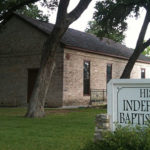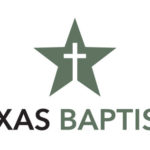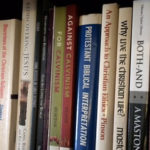WACO—The Baptist Studies Center for Research at Baylor University, approved by the Baylor board of regents at their February meeting, will preserve the 400-year global heritage of Baptists through a virtual depository of important Baptist documents, photographs, books and other collections.
The center, which will include hundreds of thousands of items already housed throughout Baylor’s campus, will be established through the department of religion in Baylor’s College of Arts and Sciences. It will continue the Baptist story as part of the university’s mission, said Bill Bellinger, chairman of the religion department.

“We think Baylor is the logical place for this center,” he said. “We’ll have a new layer of accessibility for researchers.”
Besides making materials about Baptist heritage available for visiting scholars, who in return will provide a lecture series, the center will support research projects for Baylor faculty and encourage students to learn about Baptist identity. Materials also will be accessible for laity.
Baylor and other institutions hold a treasure trove of Baptist materials, and the center will work with libraries throughout in the country and abroad to create an ongoing virtual collection. Work on digitizing materials already has begun at Baylor.
“We’re getting a better handle on resources we already have on hand,” Bellinger said. “We’re happy for the materials to stay where they are, but what we hope for is virtual access. We hope a lot of these things can become available online, and we have not limited ourselves to what’s on the Baylor campus, because there are other excellent resources elsewhere.”
Significant documents, books, photographs, letters and recordings are housed at Baylor in several locations, including the Institute for Oral History, the J.M. Dawson Institute of Church-State Studies , Baylor University Central Libraries, George W. Truett Theological Seminary , Armstrong Browning Library and the Texas Collection.
The Baptist Studies Center for Research will:
• Serve as a resource for visiting scholars, who also will lecture at Baylor.
Sign up for our weekly edition and get all our headlines in your inbox on Thursdays
• Provide access to materials for those researching the Baptist tradition, regardless whether they are able to travel to actual collection sites.
• Support such faculty research projects as “Early English Baptist Texts” and The Baptists’ Bible project, with Baylor University Press to be a publishing partner with connections to the Baptist World Alliance. The ongoing Bible project is a commentary on Baptist interpretations of Scripture from the 17th century to the present and shows ways Baptists have used the Bible in confessions, sermons and other documents.
• Sponsor an essay contest for students on Baptist identity and encourage student travel and study.
• Support entities which contribute to such journals as Baptist History and Heritage and Perspectives in Religious Studies. Among the organizations are the Baptist History and Heritage Society , the National Association of Baptist Professors of Religion and the Association of Ministry Guidance professionals.
• Provide an emphasis in Baptist studies for the Ph.D. program in religion. Baylor is the only Baptist university that offers a doctor of philosophy program in religion, Bellinger said. The program rose significantly in the recent National Research Council rankings, making major strides in several areas, including faculty productivity.
While some other Baptist universities house collections, “They’ve often been specifically tied to church relations or undergraduate curriculum,” Bellinger said. “There really hasn’t been something comprehensive and tied to research.
“We have resources with our digitizing that not everybody has, and we can work together,” he said.
Among those resources is a scanner capable of turning pages and simultaneously shooting fronts and backs of pages at a rate of 2,400 pages per hour.
Using that scanner, the digitization of more than 43,000 pages of Southern Baptist Convention annuals — dating back to 1845 — has begun, with students, supervised by electronic library staff, assisting.
Many of the annuals contain printed sermons and speeches illustrating Baptist doctrine, Bellinger said.
Another scanner is capable of scanning images up to 5 feet wide, 8 feet long and 12 inches deep. Baylor is the only university in Texas that has such a scanner, and it has been used to scan large portraits –including paintings and photographs — of Baylor presidents, said Eric Ames , digital collections consultant with University Electronic Libraries.
Since April 2009, faculty members of Baylor’s department of religion have traveled with Kathy Hillman, director of special collections for central libraries at Baylor, to libraries in the United States and England to view materials and discuss the possibility of sharing materials.
William Pitts, professor of religion at Baylor, visited Angus Library at Oxford University in England, which has a national library and archive for Baptist and non-conformist history and heritage; and Doug Weaver — associate professor of religion at Baylor, undergraduate program director and coordinator of the research in Baptist studies — traveled to the Southern Baptist Historical Library and Archives in Nashville, Tenn.
Bellinger traveled to the American Baptist Samuel Colgate Historical Library and Archives in Atlanta. It houses tens of thousands of artifacts of Baptist history, some from its roots amid Germans and the Dutch, and records of the modern missionary movement, African-American church associations, women's work and the social gospel movement.
“Other libraries graciously received us and have shown much interest in the goals of our center,” Weaver said. “We look forward to the possibility of developing increased cooperation with Baptist libraries in the U.S. and abroad.”
Among materials in Baylor’s collections are:
• More than 100,000 photos, documents and correspondences of Baylor’s presidents.
• The personal archives of Joan Riffey Sutton, retired musical missionary and 1951 Baylor graduate. She and her husband, Boyd Sutton, were missionaries in Brazil from 1959 to 1993 and helped organize and translate hymnody for Portuguese-speaking congregations.
• Eyewitness recordings of denominational leaders, pastors, missionaries and laity, including interviews with Baptists representing the Baptist General Convention of Texas, Mexican Baptist Convention (today’s Hispanic Baptist Convention), Cooperative Baptist Fellowship, North American Baptist Conference, the Southern Baptist Convention, the Baptist World Alliance and the American Baptist Convention. Among topics are Baptists and race relations, women in ministry, rural churches and the fundamentalist movements of the early and late 20th century.
• Recorded interviews of histories of Baptist institutions, including Baylor University, University of Mary Hardin-Baylor, Wayland Baptist University, South Texas Children’s Home, Mexican Bible Institute, Southern Baptist Theological Seminary, Southwestern Baptist Theological Seminary, Woman’s Missionary Union and the Baptist Student Union.
• Photographs, letters, diaries and other memorabilia of William Buck Bagby and Anne Luther Bagby, pioneer Baptist missionaries, and their family. The Bagbys served in Brazil from 1882 to 1939. They had nine children, five of whom lived to maturity and became missionaries in South America. Anne Bagby was the daughter of John Luther, president of Baylor Female College.
Thelma Cooper, a granddaughter of the Bagbys and retired assistant professor of piano at Baylor, and her husband, Bill Cooper, retired professor of philosophy at Baylor, are excited about the center’s potential. They regularly visit and contribute to The Texas Collection housed in Baylor’s Carroll Library, recently donating photograph albums.
“It’s putting your life out there for the public to see your weaknesses and successes as well, but it seems right that these things should be in a place where people can have access to them,” Thelma Cooper said.
“It’s not just about the Bagbys and Luthers but about trying to attract other collections.”
Another individual enthusiastic about the center is Alan Lefever, director of the Texas Baptist Historical Collection , the official depository of the Baptist General Convention of Texas. Lefever also chairs a committee of the Association of Librarians and Archivists at Baptist Institutions, which is seeking to launch a digital Baptist library.
“If the digital library gets off the ground, it will provide another avenue for the Baptist Studies Center for Research to have access to,” said Lefever, an adjunct professor at Baylor’s Truett Theological Seminary.
People interested in the Baptist story eventually will have greater access to research material online.
“Most people assume that digital collections decrease on-site use, but the opposite is actually true,” Hillman said. “Usually if they see things online, they want to come see the real thing. It actually increases interest. The wave of the future is knowing where the materials are and making them available to scholars around the world.”
Weaver said the center “will be unique if we can get it birthed here."
“We want to affirm that we are completely a part of the larger Christian tradition, but we want to participate and celebrate our Baptist tradition,” he said. “It’s not ‘either/or.’ It’s ‘both/and.’ Our story is worth celebrating and learning.”














We seek to connect God’s story and God’s people around the world. To learn more about God’s story, click here.
Send comments and feedback to Eric Black, our editor. For comments to be published, please specify “letter to the editor.” Maximum length for publication is 300 words.